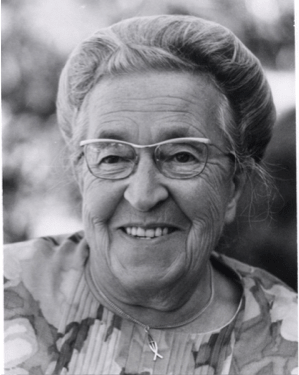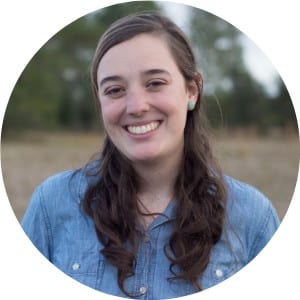Koinonia Farm’s vision statement is “love through service to others, joy through generous hospitality, peace through reconciliation.” All of our guest rooms are named after people who have come before us and embodied these ideas. These peacemakers are from all over the world and from all different periods of history. This “great cloud of witnesses” and their stories encourage us to keep pursuing love, joy, and peace in our life and work.

Corrie ten Boom was born on April 15, 1892 in Haarlem, Netherlands. She was the youngest of four children: she had two older sisters and an older brother. Her father was a watchmaker and the family lived in rooms above his shop on Barteljorisstraat. They nicknamed the house “Beje House” after an abbreviated name for the street. The family were devout members of the Dutch Reformed Church. When Corrie was a young woman, her mother died. In 1922, Corrie became the first female licensed watchmaker in the Netherlands and worked alongside her father in his shop. She never married and remained living at home along with her father and sister. In the years leading up to World War II, she started a club for teenage girls. They would meet and have classes about religion as well as sewing and other handiwork.
At the outbreak of World War II, Beje House was a refuge for Jews and other resistors of the Nazi regime. The house became part of the Dutch Underground. The ten Boom family began hiding Jews until they could be smuggled out of the city to safer places. The ten Booms built a secret room in Corrie’s bedroom. It was the size of a medium closet and could hold up to six people. They installed a buzzer in the house so people could be warned if the house was to be inspected and hide quickly.
Do you know what hurts so very much? It’s love. Love is the strongest force in the world, and when it is blocked that means pain. There are two things we can do when this happens. We can kill that love so that it stops hurting. But then of course part of us dies, too. Or we can ask God to open up another route for that love to travel.
On February 28, 1944, the Gestapo raided Beje House. Over 30 people were arrested, but the six Jews hiding in Corrie’s room were not found. They were rescued by the Dutch Underground a few days later. All of the people who were arrested were eventually released except for Corrie, her father Casper, and her sister Betsie. Casper died in the a concentration camp soon after his arrest. Betsie and Corrie were sent from camp to camp and ended up in Ravensbrueck. Bestie died there in December 1944. Corrie was released two weeks later due to a clerical error. She traveled to Germany were she met family and stayed until the end of the war.
There is no pit so deep, that God’s love is not deeper still.
After the war, Corrie returned to the Netherlands and opened a rehabilitation center for concentration camp survivors. She then traveled around the world telling her story and preaching the importance of forgiveness. She wrote many books: the most famous of which is The Hiding Place, the story of her time at Beje House and in Ravensbrueck. The book was published in 1971 and in 1975 it was made into a movie. Corrie moved to California in 1977. She died on April 15, 1983 at age 91. Corrie ten Boom fought against oppression, was willing to give her life to fight injustice, and survived concentration camps. She was able to forgive her oppressors. Her message of forgiveness and grace transcends her own time and continues to speak today.
Forgiveness is the key that unlocks the door of resentment and the handcuffs of hate. It is a power that breaks the chains of bitterness and the shackles of selfishness.


